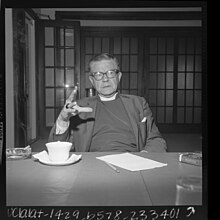James Pike
| James Albert Pike | |
|---|---|
| Bishop of California | |

James A. Pike in 1966
|
|
| Church | Episcopal Church in the United States of America |
| See | California |
| In office | 1958–66 |
| Predecessor | Bishop Karl Morgan Block |
| Successor | Bishop Kilmer Meyers |
| Orders | |
| Ordination | 1946 |
| Consecration | 1958 |
| Personal details | |
| Birth name | James Albert Pike |
| Born |
February 14, 1913 Oklahoma City, OK |
| Died | September 3, 1969 (aged 56) Wadi Mashash, Israel |
James Albert Pike (February 14, 1913 – c. September 3-7, 1969) was an American Episcopal bishop, prolific writer, and one of the first mainline religious figures to appear regularly on television.
His outspoken, and to some, heretical views on many theological and social issues made him one of the most controversial public figures of his time. He was an early proponent of ordination of women, racial desegregation, and the acceptance of LGBT people within mainline churches. Pike was the fifth Bishop of California. Late in his life he explored psychic experimentation in an effort to contact his recently deceased son.
Pike was born in Oklahoma City on February 14, 1913. His father died when he was two, and his mother married California attorney Claude McFadden. The young Pike was a Roman Catholic and considered the priesthood; but, while attending the University of Santa Clara, he came to consider himself an agnostic. Pike earned a doctorate from Yale Law School and married Jane Alvies. He served as an attorney in Washington, D.C., for the Securities and Exchange Commission (SEC) during Franklin D. Roosevelt's New Deal era and taught Law at George Washington University. In World War II, he served with Naval Intelligence.
After World War II, Pike and his second wife joined the Episcopal Church. He first entered Virginia Theological Seminary and then Union Theological Seminary, to prepare for the priesthood. He was ordained in 1946, first serving as an assistant at St. John's, Lafayette Square in Washington, D.C., then as Rector of Christ Church in Poughkeepsie, New York. He next became head of the Department of Religion and chaplain at Columbia University. He left Columbia in 1952 to become the Dean of the Cathedral of St. John the Divine, New York. Using his new position and media savvy, he vociferously opposed the local Catholic bishops over their attacks on Planned Parenthood and their opposition to birth control. He accepted an invitation to receive an honorary doctorate from Sewanee: The University of the South in Tennessee, but then publicly declined after finding that the university did not admit African Americans. An example of Pike's use of the media is how he released his letter to the New York Times before it was delivered to Sewanee's trustees: they heard the news when reporters called for reactions. It was also at this time that he publicly challenged Senator Joseph McCarthy's allegation that 7,000 U.S. pastors were part of a Kremlin conspiracy; when the newly elected President Dwight D. Eisenhower backed up Pike, McCarthy and his movement began to lose their influence.
...
Wikipedia
